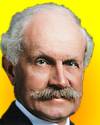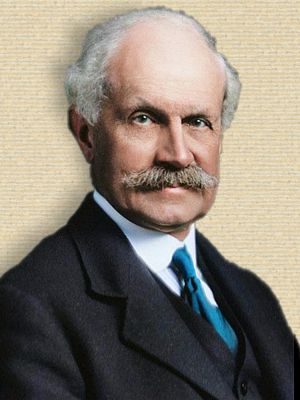 (source)
(source)
|
Sir J. Graham Kerr
(18 Sep 1869 - 21 Apr 1957)
English embryologist whose research added knowledge of the evolution of vertebrates. He also promoted ideas in naval camouflage for WWI.
|
Graham Kerr: A Luminary
in Embryology and Ichthyology
In the annals of science, the name of Sir John Graham Kerr (1869–1957) might not immediately ring a bell, yet his contributions in embryology and ichthyology have left an indelible mark in these fields of biological sciences. Apart from being a prolific biologist, he was also a politician and served as a Member of Parliament in the UK.
Widely known by his middle name, Graham Kerr ventured into a scientific career that would lead to groundbreaking works, particularly in the study of fish embryology and evolution. This article delves into the scientific contributions of John Graham Kerr, his discoveries, and how his work forged pathways in evolutionary biology.
Embryology: Laying Foundations for Modern Biology
Kerr was a central figure in the embryology sector during the early 20th century. He is well-known for his extensive study on the embryonic development of various fish species, particularly the South American lungfish (Lepidosiren paradoxa). Through painstaking research, Kerr illustrated the various stages of development of this species, offering critical insights into the evolutionary steps between fish and amphibians. His work in embryology went beyond mere observation and delved deep into analyzing the anatomical and physiological aspects of embryonic growth and development, expanding the then-existing knowledge in this field.
Ichthyology: A Foray into the World of Fish
Besides his work in embryology, Kerr also made substantial contributions to ichthyology, the study of fish. He undertook extensive studies on the biology and evolution of Agnatha, a superclass of jawless fish. Through meticulous research, he helped unravel the complex evolutionary history of these early vertebrates, providing a clear perspective on the evolutionary transitions that led to the development of jawed vertebrates.
His studies on the South American lungfish also contributed significantly to ichthyology, helping to uncover the intricate evolutionary links between fish and amphibians, thus offering a new dimension in understanding the transition from aquatic to terrestrial life.
A Visionary in the Field of Warship Camouflage
Outside the realms of embryology and ichthyology, Kerr was a visionary in the field of military camouflage. Drawing inspiration from his studies on the adaptive coloration in fish, he proposed innovative ideas for camouflaging ships during World War I. His ideas were based on the principle of disruptive coloration, which aimed at breaking the outline of the ships, making it difficult for the enemy to estimate the ship’s size, shape, and distance. Although only partially implemented at the time, his proposals laid the foundations for modern camouflage techniques.
Education and Advocacy
Apart from his research contributions, Kerr also played a pivotal role in education and advocacy for science. He served as Regius Professor of Natural History at the University of Glasgow, fostering the next generation of scientists and contributing to the growth of the scientific community in the UK. Furthermore, he was a staunch advocate for science education and emphasized the importance of research in shaping the future of society.
John Graham Kerr’s life was a symphony of numerous pioneering contributions in the realms of embryology and ichthyology. His investigations into the world of embryonic development and evolutionary biology have carved pathways for further research in these fields. Additionally, his visionary approach towards military camouflage marked him as a man ahead of his time.
Through a career marked by innovation and dedication, Kerr has secured his legacy in the annals of science as a luminary who expanded the horizons of biological research and understanding. Current and future generations of biologists who take time to reflect on his contributions, should find they resonate, inspiring a fresh perspective, and insatiable curiosity for further exploration in the fascinating world of biological sciences.
- 18 Sep - short biography, births, deaths and events on date of Kerr's birth.
- More for Sir J. Graham Kerr on Today in Science History page.
- Zoology for Medical Students (reprint), by J. Graham Kerr. - book suggestion.

500x250px.jpg)




